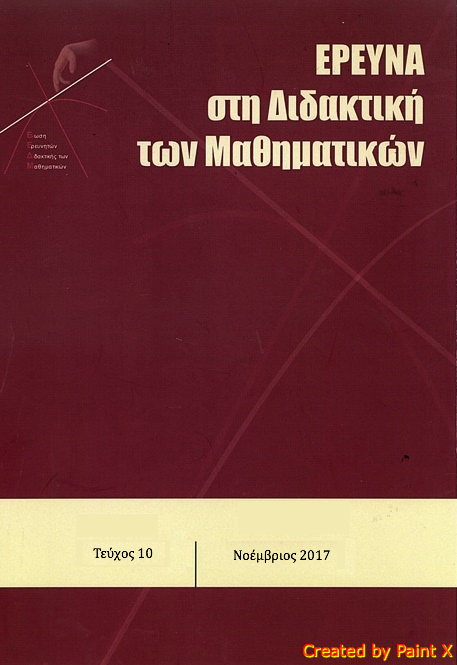ΕΝΤΑΞΗ ΚΑΙ ΑΠΟΚΛΕΙΣΜΟΣ ΣΤΗ ΜΑΘΗΜΑΤΙΚΗ ΕΚΠΑΙΔΕΥΣΗ ΚΑΙ ‘ΚΑΤΑΣΚΕΥΗ’ ΤΟΥ ΣΥΓΧΡΟΝΟΥ ΠΟΛΙΤΗ

Περίληψη
Είναι προφανής αλήθεια σήμερα ότι η Μαθηματική Εκπαίδευση αποτελεί πυλώνα της πολιτειότητας (citizenship), όπως είναι προφανής αλήθεια και το γεγονός ότι η Μαθηματική Εκπαίδευση πρέπει να είναι για όλους. Αλλά επίσης είναι αλήθεια ότι η Μαθηματική Εκπαίδευση σίγουρα δεν είναι για όλους. Θεωρώντας τα σχολικά μαθηματικά ως προνομιούχο περιοχή του σχολικού προγράμματος σπουδών είναι σημαντικό να κατανοήσουμε πώς, στις σύγχρονες κοινωνίες, οι πρακτικές της Μαθηματικής Εκπαίδευσης συνιστούν αναπόφευκτους μηχανισμούς τόσο ένταξης όσο και αποκλεισμού. Αλλά ... ένταξη και αποκλεισμός από ποιον; σε / από τι; Η πρόθεσή μου σε αυτή την εργασία, αντλώντας από το έργο του Michel Foucault, είναι η οριοθέτηση μιας αναδυόμενης τάσης στην έρευνα για τις πολιτικές της Μαθηματικής Εκπαίδευσης ως ιστορικές και πολιτισμικές πρακτικές στο πλαίσιο της σχολικής εκπαίδευσης. Η μετάβαση από μια εστίαση στην πολιτισμική κατανόηση της μαθηματικής σκέψης, προς την κατανόηση των σχολικών μαθηματικών ως τομέα του αναλυτικού προγράμματος στη σύγχρονη σχολική διαδικασία στον 20ό αιώνα επιτρέπει τον προσδιορισμό της σύστασης των συστημάτων λογικής που διέπουν τις εκπαιδευτικές πρακτικές στα μαθηματικά. Αυτός ο εντοπισμός φέρνει διαφορετικές θεωρήσεις για την κατανόηση της αποτυχίας και της επιτυχίας στα σχολικά μαθηματικά. Αξιοποιώντας υλικό από την τρέχουσα έρευνα μου θα κάνω φανερό πώς τέτοιοι τύποι ανάλυσης ξεδιπλώνουν τις συνθήκες μέσα στις οποίες η Μαθηματική Εκπαίδευση πραγματώνει την ένταξη ή τον αποκλεισμό.
Λεπτομέρειες άρθρου
- Πώς να δημιουργήσετε Αναφορές
-
Valero, P. (2017). ΕΝΤΑΞΗ ΚΑΙ ΑΠΟΚΛΕΙΣΜΟΣ ΣΤΗ ΜΑΘΗΜΑΤΙΚΗ ΕΚΠΑΙΔΕΥΣΗ ΚΑΙ ‘ΚΑΤΑΣΚΕΥΗ’ ΤΟΥ ΣΥΓΧΡΟΝΟΥ ΠΟΛΙΤΗ. Έρευνα στη Διδακτική των Μαθηματικών, (10), 9–26. https://doi.org/10.12681/enedim.15204
- Ενότητα
- Άρθρα

Αυτή η εργασία είναι αδειοδοτημένη υπό το CC Αναφορά Δημιουργού 4.0.
Οι συγγραφείς των άρθρων που δημοσιεύονται στο περιοδικό διατηρούν τα δικαιώματα πνευματικής ιδιοκτησίας επί των άρθρων τους, δίνοντας στο περιοδικό το δικαίωμα της πρώτης δημοσίευσης. Άρθρα που δημοσιεύονται στο περιοδικό διατίθενται με άδεια Creative Commons BY και σύμφωνα με την άδεια μπορούν να χρησιμοποιούνται ελεύθερα, με αναφορά στο/στη συγγραφέα και στην πρώτη δημοσίευση.

